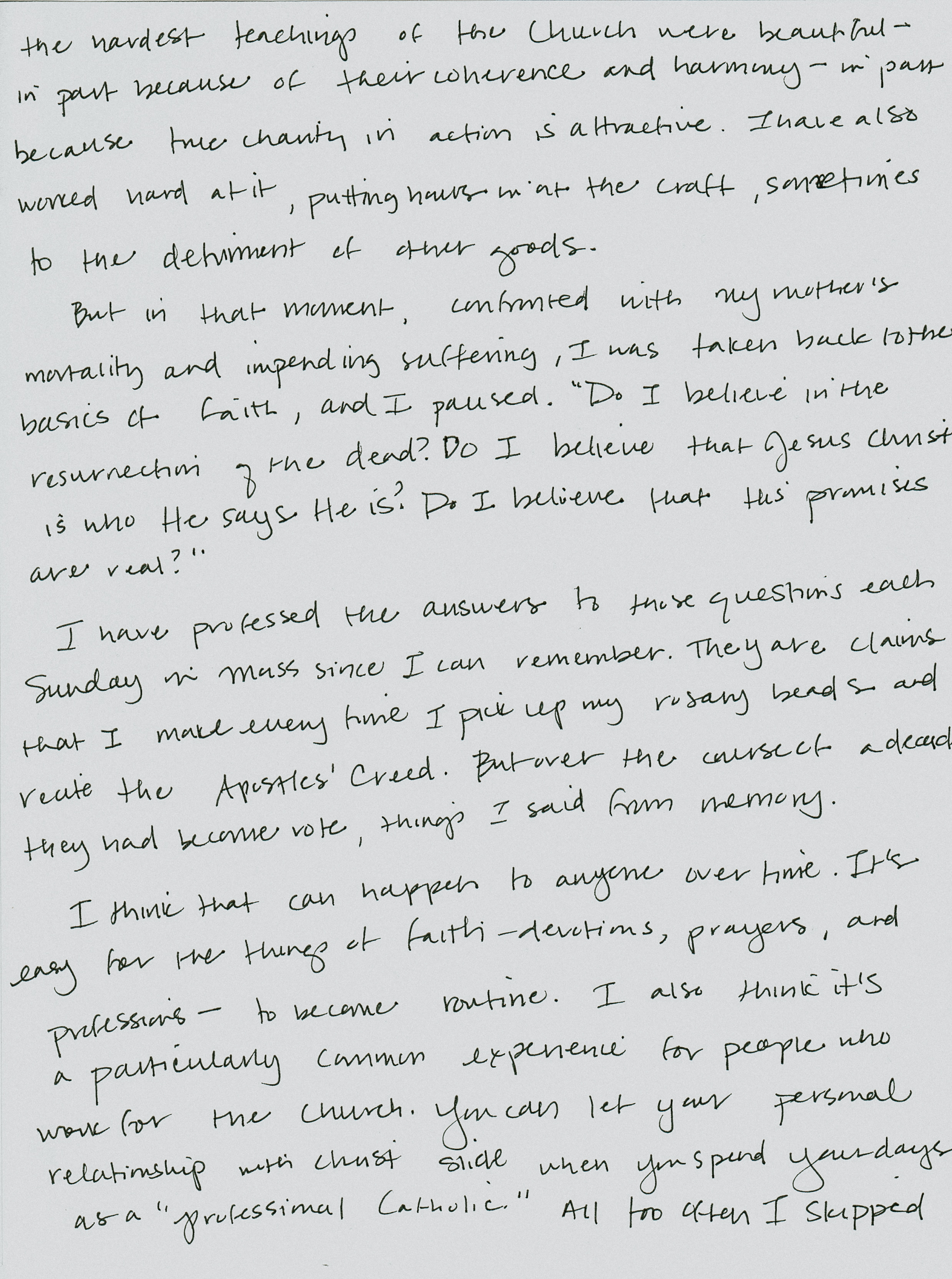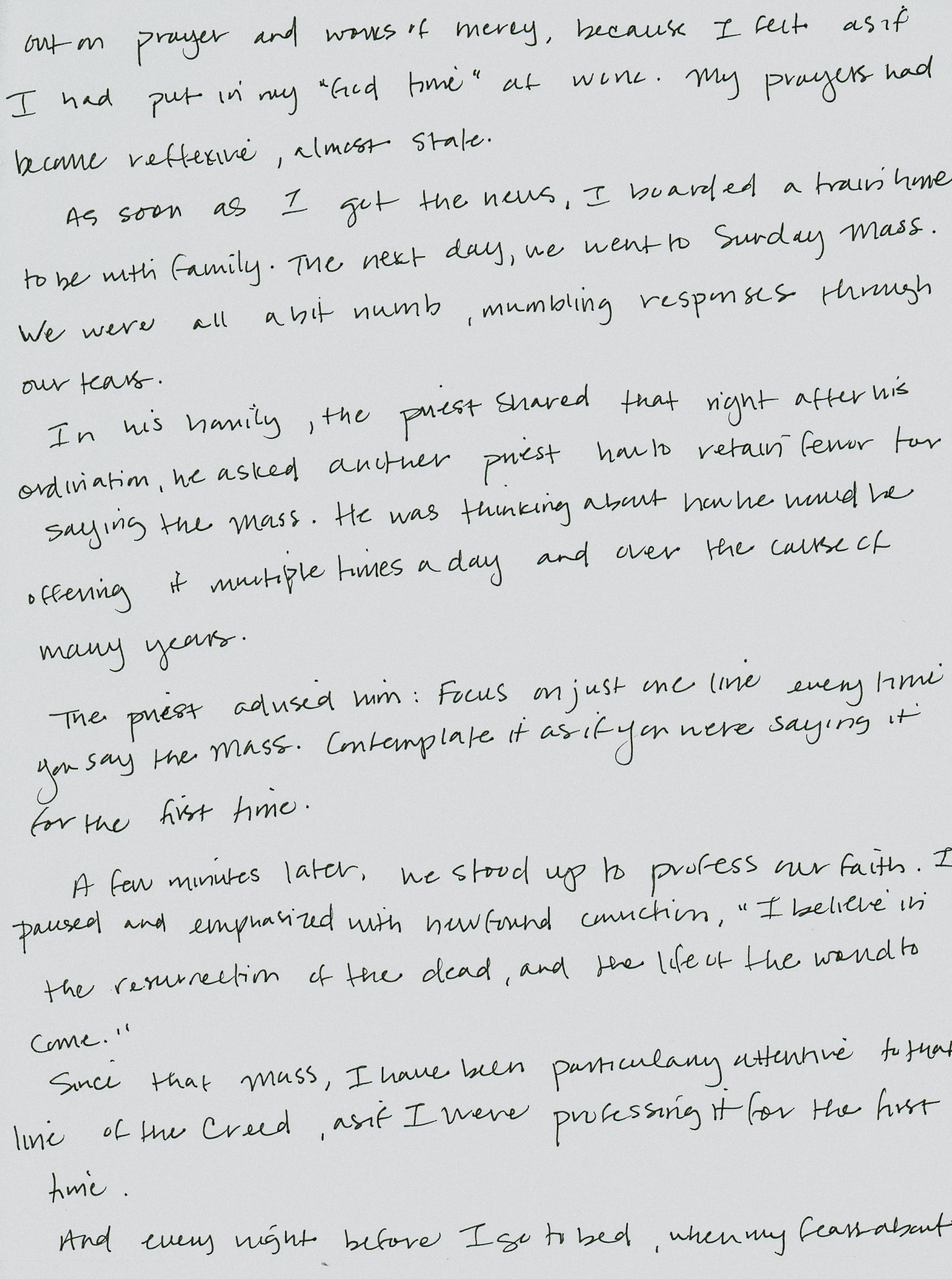Who Do You Say That I Am?
Letter from Elise Italiano
Dear Sister,
Have you ever had an experience in which you were forced to confront what you really believe? Have you ever had to answer the question that Jesus posed to St. Peter, “But who do you say that I am?”
Since January 2017, I’ve made it a point to answer that question every night before I go to bed.
That practice began on a rather unremarkable street corner in Manhattan, between Penn Station and Chelsea. I think it’s 7th and W 30th, but I can’t be sure. It’s got a flower stand, and at least one hot dog vendor parks his truck there. By any measure, people should pass it by.
But it was on that street corner – almost two years ago – when I picked up a phone call from my mom that changed my life. She told me that she had just been diagnosed with ALS.
Amyotrophic lateral sclerosis is a progressive neurodegenerative disease that affects nerve cells in the brain and spinal cord. The average patient with ALS lives only two to three years after the onset of symptoms. It makes for a debilitating and harrowing road.
After my mom finished speaking, my hands and knees began to tremble. I found myself gasping for breath.
Four of our family friends have suffered and died from ALS. Given how rare the disease is, we’ve already had an unnaturally close to relationship to it.
As my mom spoke, I tried to steady myself. Pedestrians walked right by me, oblivious to my new reality.
Suddenly a piercing thought came to mind and focused my attention: “Do I believe in the resurrection of the dead?” Of all the things running through my brain, this one moved to the front of the queue.
It is a question I should have been able to answer quickly and affirmatively. You see, I spent six years teaching theology and bioethics to high school women. Then four years serving as a spokeswoman for a Catholic bishop and for the bishops’ university.
That’s ten years of explaining and defending some of the most hot-button tenets of the Catholic faith in the classroom and to the press. I was able to do those things because I have always found that even the hardest teachings of the Church were beautiful – in part because of their coherence and harmony – in part because true charity in action is attractive. I had also worked hard at it, putting in hours at the craft, sometimes to the detriment of other goods.
But in that moment, confronted with my mother’s mortality and impending suffering, I was taken back to the basics of faith, and I paused. “Do I believe in the resurrection of the dead? Do I believe that Jesus Christ is who He says He is? Do I believe that His promises are real?”
I have professed the answers to those questions each Sunday in Mass since I can remember. They are claims that I make every time I pick up my rosary beads and recite the Apostles’ Creed. But over the course of a decade, they had become rote, things I said from memory.
I think that can happen to anyone over time. It’s easy for the things of faith – devotions, prayers, and professions – to become routine. I also think it’s a particularly common experience for people who work for the Church. You can let your personal relationship with Christ slide when you spend your days as a “professional Catholic.”
All too often I skipped out on prayer and works of mercy, because I felt as if I had put in my “God time” at work. My prayers became reflexive, almost stale.
As soon as I got the news, I boarded a train home to be with my family. The next day, we went to Sunday Mass. We were all a bit numb, mumbling responses through our tears.
In his homily, the priest shared that right after his ordination, he asked another priest how to retain fervor for saying the Mass. He was thinking about how he would be offering it multiple times a day and over the course of many years.
The priest advised him: Focus on just one line every time you say the Mass. Contemplate it as if you were saying it for the first time.
A few minutes later, we stood up to profess our faith. I paused and emphasized with newfound conviction, “I believe in the resurrection of the dead, and the life of the world to come.”
Since that Mass, I have been particularly attentive to that line of the Creed, as if I were professing it for the first time.
And every night before I go to bed, when my fears about how the disease will progress weigh most heavily on my mind, I ask St. Peter for the strength to answer Jesus’ question in the same way that he did. “You are the Christ, the Son of the living God,” I whisper before closing my eyes.
I learned on a street corner in Manhattan that the Lord didn’t need my busyness for the Kingdom. He didn’t need my perfectly crafted lesson plans or talking points. He wanted me to look Him in the eyes and gaze upon Him when I was speaking to Him. He wanted to know that I loved Him and believed that He is who He says He is.
Where is Christ trying to meet you? What does He want to ask?
My prayer, dear sister, is that if He asks you what you believe, you will have the grace to respond with conviction that His promises are true. Because they are. And we will know them in the life of the world to come.
Yours,
Elise
Elise Italiano is the Founding Executive Director of The GIVEN Institute, a not-for-protfit organization dedicated to inspiring and equipping the next generation of Catholic women leaders for service to the Church and culture. She is a native of New Jersey but a recent transplant to Boston. She will be married in December to the man of her dreams, who it turns out, was worth the painstaking wait. Her favorite women writers include Flannery O'Connor, Julian of Norwich, and Louisa May Alcott.
Want to repost this quote? On your smart phone: press, save and share.
Read Related Letters













Suddenly a piercing thought came to mind and focused my attention: “Do I believe in the resurrection of the dead?” Of all the things running through my brain, this one moved to the front of the queue.